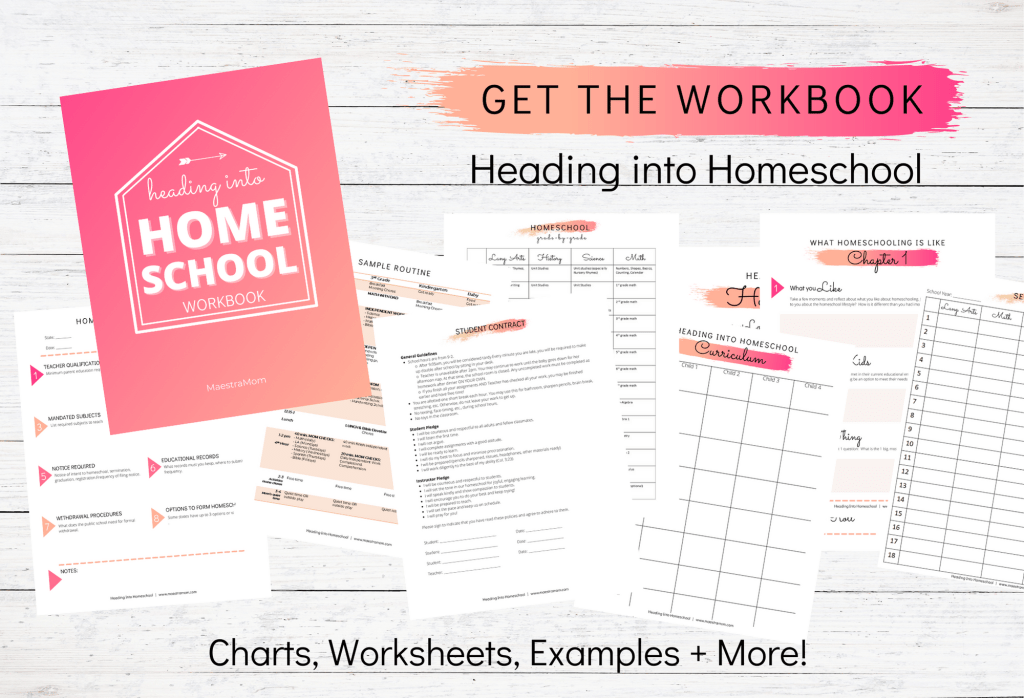Trying to homeschool a strong-willed child? A defiant, willful child is super tough for any parent. But when you throw homeschooling into the mix, it can quickly become a daily battleground and nightmare for both you and your child.
I know because I’ve had a strong-willed child myself! Homeschooling a challenging child is no walk in the park. So, what can you do?
How do you homeschool a strong-willed child?
Start by asking yourself these 7 questions.
1. Is school too hard?
When you have a strong-willed child who is resisting learning, the very first question to address is if the instruction matches the educational level of your child.
In other words, is the schoolwork too easy or too difficult? When kids are bored and work is too easy, they may act out or resist learning. On the other hand, when the work is too challenging, some strong-willed kids deal with their feelings of failure by goofing off or refusing to the do the work.
It can look the same! So, it’s important for homeschool parents to evaluate if the level of instruction matches the child’s learning ability.
Some curricula are better fits for some kids than others, too, depending on your child’s learning style. So, start by looking at your strong-willed child as an individual and try to see their schoolwork through their eyes.
Just imagine how you would feel if you were asked to do something day after day that was too tough or super boring.
2. Could there be any special needs?
It can be really challenging and scary for parents to consider the idea that their child may have a learning disability. But don’t miss this step! Once you know, you can find ways to help your child and you may discover that their strong-willed behavior was just a smokescreen for a more pressing issue.
Is your child struggling with reading?
Are you concerned that your child might not be on grade level with reading? You can quickly and easily assess your child’s reading level at home using any book. It only takes about 10-15 minutes and will help you know if reading is the issue.
Kids in kindergarten and first grade are just beginning to read, but by 2nd grade, most kids are reading relatively fluently. If your child is still struggling to read by the end of 2nd grade or 3rd, that’s usually a red flag that something else, like dyslexia, may be going on. No worries – there’s help for that, too!

Could it be ADHD?
If reading isn’t the issue, take a step back and consider if your child may be ADHD or have a learning disability.
Homeschool kids are entitled to free evaluations at public schools. Just call your local school, ask for the school counselor or special education contact, and ask for a free special education evaluation. Typically, you then must submit your request in writing to the school principal for a free evaluation for special education.
They can’t turn you away! Anyone – even a homeschool parent – is legally allowed to ask for a referral and the public school must provide testing.
It sounds scary, but it is just a series of tests that will give you really great information about how your child learns and if there are any special needs you should consider in their education. And it’s free!
You’ll feel better once you know what you are dealing with.
3. Do we have a good routine?
Now that you’ve ruled out the possibility of special needs, how can you help your strong-willed child?
Set up a predictable routine
Kids thrive on routine! (So do adults). In homeschool world, many of us tend to be a bit relaxed about education. So, set an established time to start lessons each day. Use the same sequence of subjects. Use a chart to let kids know what subject is coming up and when breaks and lunch are anticipated.
I set up a master schedule every year for my crew and we go over it as a family at the beginning of the school year. If something’s not working, we tweak it. But the schedule provides us with a predictable structure. Each child knows when they are working independently and when to expect time with Mom. It cuts down on bickering and gets us all working on the same schedule.
4. Are my expectations clear?
Kids thrive when they know what to expect. It takes the battle out of the fight when they know exactly what is coming and what you are asking them to accomplish. In other words, set your kids up for success by having very, very clear expectations.
In teacher lingo, we used to say, “tell them what you’re going to teach them, then tell them what you’re teaching them, then sum it up and tell them what they learned.” Every step of the way, don’t leave kids wondering how to please you with their schoolwork. Tell them! Spell it out and make sure they succeed!
School Rules
We may homeschool, but we still have simple, basic school rules that outline how we’re going to roll. School rules are especially helpful for strong-willed elementary age kids. And we keep it simple – only 5 or 6 basic rules that are easy to remember. I’ve used the same 6 rules with my kindergarten classroom when I taught in public schools and for the past 8 years in my homeschool. They cover everything and work like a charm.
A good way to do it is to introduce 1 or 2 rules each day during the first week of school and review them daily for the first 3 weeks. This will set you up for a smooth school year once your littles know exactly what is expected of them during schooltime.
A page-size poster of these rules are provided for you in my Heading into Homeschool Workbook (free when you buy the Heading into Homeschool book) and they’re also available in poster form here.

Student contract
For older kids, I like to use a student contract that spells out in writing exactly what is expected of students and parents. This doesn’t have to be a major production, but can be a positive, shared experience between you and your child on the first day of school.
Read the contract aloud together. Discuss. Ask your child to sign it then keep it posted visibly somewhere or put it inside of their weekly planner.
A contract can be a proactive step towards preventing any challenging behavior in a strong-willed child. Some contracts may also stipulate consequences for not completing schoolwork or other problems. These can be revised as needed.
A sample of our first-day-of-school contract is included in the Heading into Homeschool Workbook. Feel free to copy it and tweak it for your own family! We have used it every year for the past many years.

5. Am I working my strong-willed kid too hard?
Kids need breaks. Adults need breaks, too. Expect hard work from your kids, but also build in breaks. A strong-willed child may just be a wiggly, active little guy who isn’t quite ready yet for formal learning. Break up your instruction! Even older kids work best with some well-timed breaks built into the schedule.
Intersperse physical activity
Find learning activities that require movement and physical activity. There are so many ways to do this!
- Kids can hop while spelling out spelling words
- Leap from sight word to sight word to practice reading
- March to learn skip-counting
- Go on nature walks.
- Take recess in the back yard.
- Go on a trip to the Farmer’s Market.
- Do school work standing up or sitting on a large yoga ball.
- Do hand-writing upside down by taping your paper to the underside of a table and lying on the floor Michelangelo style.
Race a timer
Try having your child race completing school work to a timer! My own strong-willed child really responded to this when he was in elementary school. He struggled with focusing, but it helped when I would set the timer for 5 minutes and have him race it. If he beat the timer, he got a Cheerio. Easy-peasy!
Positive Motivation
Offer your strong-willed child something they want as a reward for doing good work. Does your child love to read? Have her earn reading a chapter of her favorite book after finishing her morning’s school work. Like riding bikes? Try a ride around the block after completing a few school lessons.
Small work spurts
Some kids need to work in small spurts of academic work with frequent breaks. Try taking a break after every subject or every so many minutes. There are tons of short movement songs for kids on YouTube if you google “brain breaks”. Let kids wiggle and move as a brain break. Just keep breaks short and let them know ahead of time that you expect them to get back to work quickly afterwards.
6. Am I teaching right from wrong?
As parents, we’re the ones God charges with teaching our kids right from wrong. This is a big task and needs to happen daily in small doses throughout their lifetime! Kids don’t come preprogrammed to know what is right and what is wrong. It’s our job to teach them.
Our task is to use God’s word like a measuring stick to show them what is good and what is evil.
Discipline your son, and he will give you rest;
Proverbs 29:17
he will give delight to your heart.
Teach them about willfulness
Sometimes, a strong-willed child needs to be firmly but gently told that their stubbornness is wrong. After setting the rules and expectations, then setting them up for success through a solid routine, it’s up to us to tell kids when they’re behavior is not acceptable.
Of course there are times when ignoring misbehavior is what’s needed, but other times, we need to gently but bluntly correct our strong-willed child about their willfulness. They may not realize that willfulness is wrong.
He who is often reproved, yet stiffens his neck,
will suddenly be broken beyond healing.
Proverbs 29:1

7. Are the consequences clear?
Another aspect of working with a strong-willed child is to set clear consequences for misbehavior. If you know it’s likely to happen, then get ready for it! Spend time thinking of how your strong-willed child is likely to thwart you and be ready with consequences!
Remember – you can’t control your child’s behavior. They are free to do whatever they want to do. However, you can control the consequences for behavior. So, let your child know ahead of time what those consequences will be.
Use an if/then chart
An if/then chart is a written chart stating in simple terms what will happen if you choose a certain behavior. IF you choose this THEN such-n-such will happen.
One of the hardest parts of being a parent or homeschool teacher is being consistent. A posted if/then chart helps both the child and the parents to be consistent.
Examples of if/then statements are:
- If you do not finish your schoolwork by 3 pm then you must complete your schoolwork after dinner missing out on the family’s fun activities.
- If you are disrespectful, then you must do 3 nice things for the other person to make amends.
- If you are not in your seat ready to begin school by 9 am, you must stay for 10 extra minutes in your seat after school.
- If you argue or talk back to the teacher, you must write “I will not argue back” 10 times.

How do you homeschool a defiant child?
Homeschooling a defiant child can be a huge challenge but it starts with asking yourself these 7 questions. Do everything you can to set your child up for success with a smooth, predictable learning environment. And don’t forget to actively teach what is right! Your strong-willed child is a gift from God and he can use that strong will for his glory!

